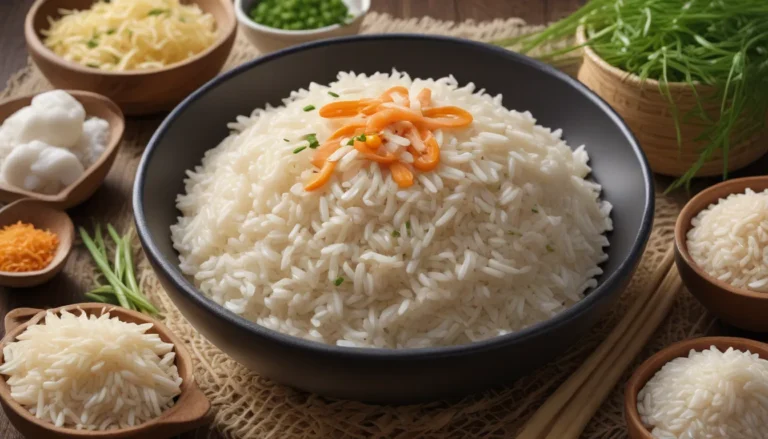The pictures in our articles might not always show exactly what the text is talking about. We use these images to make the article more interesting and eye-catching. They are there to add to the text, but not to replace it or show every detail.
If you're a fan of diverse cuisines and are looking to enrich your culinary experience, you might have come across fufu, a traditional African dish gaining global popularity. But did you know that fufu is not only a delicious meal but also a powerhouse of nutrition? From its high carbohydrate content for energy to its rich source of vitamins and minerals, fufu offers a variety of health benefits that make it a worthy addition to your diet. In this article, we'll delve into the 18 nutrition facts of fufu, shedding light on why this beloved African dish deserves a spot on your plate. Whether you're already a fufu enthusiast or new to this culinary delight, get ready to uncover the incredible health benefits and nutritional value of fufu.
The Nutritional Powerhouse: Fufu
Key Takeaways:
- Fufu is a healthy and fulfilling African dish made from starchy root vegetables like yam and plantains. It's high in energy-boosting carbs, low in fat, and rich in vital nutrients, supporting gut health and digestion.
- Fufu is not just a meal; it's a cultural symbol and a social experience that brings people together, promotes sustainable agriculture, and has gained worldwide popularity.
Fufu: A Staple in African Cuisine
Fufu is a traditional dish that holds a significant place in the culinary landscape of many African countries such as Ghana, Nigeria, and Cameroon. This dish is typically prepared by pounding boiled starchy root vegetables like yam, cassava, or plantains into a smooth and dough-like consistency, creating a delightful and hearty meal.
Carbohydrates Galore: The Energy Booster
One serving of fufu packs a powerful punch of carbohydrates, providing a substantial source of energy. This makes fufu a preferred choice among individuals engaging in physically demanding activities or those looking for a sustainable energy source.
Low in Fat, Big on Health
With its natural low-fat content, fufu stands out as a healthier option compared to other carbohydrate-rich foods that might contain higher levels of saturated fats. This makes it a guilt-free indulgence for those seeking a balanced and wholesome diet.
Gluten-Free Goodness
Made from starchy root vegetables, fufu is inherently gluten-free, making it a safe choice for individuals with gluten intolerance or those following a gluten-free diet. This opens up the culinary world to a wider audience, welcoming those with specific dietary needs.
Vitamins and Minerals: The Nutrient Powerhouse
Fufu crafted from yams or plantains boasts a treasure trove of essential vitamins and minerals, including vitamin C, vitamin B6, potassium, and manganese. These nutrients play pivotal roles in supporting overall health and well-being, contributing to a well-rounded and nourishing diet.
Fiber-Rich Feast: Promoting Digestive Health
Loaded with dietary fiber, fufu aids digestion, promotes a sense of fullness, and helps regulate bowel movements, preventing constipation. The fiber content in fufu acts as a prebiotic, nurturing healthy gut bacteria and enhancing digestive health.
Sodium Savvy: Keeping It Low
Fufu naturally maintains a low sodium profile, making it a favorable option for individuals looking to reduce their sodium intake for health reasons. This makes it a heart-healthy choice that supports overall well-being.
Versatility at Its Core
The beauty of fufu lies in its versatility. This dish can be paired with a diverse range of soups, stews, and sauces, allowing for customization to suit various tastes and preferences. Whether you prefer a spicy kick or a mild flavor, fufu can cater to your culinary desires.
Filling and Fulfilling: A Satiating Meal
Thanks to its high carbohydrate and fiber content, fufu serves as a satisfying and filling meal that keeps hunger pangs at bay. This makes it a wholesome option for individuals seeking a hearty and nourishing dining experience.
Sustainability and Fufu
Fufu supports sustainable agriculture by utilizing locally grown crops like yams and plantains, promoting eco-friendly farming practices and reducing environmental impact. By choosing fufu, you're not just nourishing yourself but also supporting sustainable food production.
Fufu for All: Vegetarian and Vegan Delight
Fufu can be prepared without the addition of animal products, making it a suitable choice for individuals following vegetarian or vegan diets. This inclusivity ensures that fufu remains a welcoming and inclusive dish for all dietary preferences.
Time-Tested Traditions: The Cultural Significance of Fufu
Fufu: A Cultural Symbol
In many African countries, fufu holds immense cultural significance, embodying traditions, community, and identity. It is often served during special occasions and gatherings, symbolizing unity and togetherness through shared culinary experiences.
The Labor of Love: Traditional Preparation of Fufu
The traditional method of preparing fufu involves the arduous task of pounding boiled root vegetables using a mortar and pestle, requiring physical strength and coordination. This labor-intensive process underscores the dedication and craftsmanship involved in creating this beloved dish.
Exploring Variations: A World of Fufu Flavors
While classic fufu is crafted from yams or plantains, there are variations of fufu made from ingredients like cocoyam, corn, or millet, each offering a distinct flavor and texture. This diversity in fufu varieties showcases the culinary creativity and adaptability of this timeless dish.
Perfect Pairings: Fufu and Traditional African Soups
Fufu is traditionally served alongside a delectable array of African soups such as egusi soup, groundnut soup, or palm nut soup, enhancing the meal with rich flavors and aromatic spices. The combination of fufu and soups creates a harmonious culinary experience that tantalizes the taste buds.
A Social Affair: The Joy of Fufu
Preparing and enjoying fufu is not just a solitary activity; it's a communal experience that brings people together to savor a delicious meal, share stories, and forge connections. Fufu transcends being just a dish; it becomes a catalyst for bonding and camaraderie.
From Local Delicacy to Global Sensation: The Rise of Fufu
Over the years, fufu has transcended its African origins and gained international acclaim, with restaurants worldwide offering their interpretations of this beloved dish. The global popularity of fufu speaks to its universal appeal and ability to captivate palates across borders and cultures.
Conclusion: Embracing Fufu in Your Diet
In conclusion, fufu emerges as a nutritional gem, offering a blend of health benefits, cultural richness, and culinary delight. From its energy-boosting carbohydrates to its fiber-rich composition, fufu stands out as a wholesome and satisfying meal option. While indulging in fufu, remember the importance of moderation, as it is calorie-dense and should be balanced with a diverse and nutritious diet alongside regular exercise. By incorporating fufu into your culinary repertoire, you not only enrich your dining experience but also embrace a cultural tradition rich in flavor and history.
Frequently Asked Questions
Q: Is fufu gluten-free?
A: Yes, fufu is typically gluten-free as it is crafted from starchy foods like cassava, yam, or plantains. However, it's advisable to check the specific ingredients used to ensure there are no gluten-containing additives.
Q: Can fufu aid in weight loss?
A: While fufu can be a satiating meal, it is calorie-dense. To support weight loss goals, moderation is key, coupled with a balanced diet and regular physical activity.
Q: Is fufu suitable for individuals with diabetes?
A: Fufu's high carbohydrate content can impact blood sugar levels. Individuals with diabetes should monitor their portions and seek guidance from a healthcare professional to incorporate fufu into their meal plans effectively.
Q: How is fufu traditionally served?
A: Fufu is commonly enjoyed with a variety of soups and stews, such as egusi soup or palm nut soup. It is often formed into small balls and dipped into the accompanying sauce before consumption.
Q: Can fufu be frozen?
A: Yes, fufu can be frozen for later use. It is recommended to wrap it tightly in plastic wrap or place it in an airtight container before freezing. Thaw the fufu in the refrigerator and reheat as desired for a convenient dining experience.
In your quest for enriching your culinary journey with diverse flavors and nutritional treasures, fufu stands as a beacon of cultural authenticity and healthful indulgence. With its rich history and robust nutritional profile, fufu invites you to savor not just a meal but an experience that celebrates unity, diversity, and the joys of shared meals. As you embark on your fufu-filled adventures, remember to relish each bite, appreciate the heritage behind this beloved dish, and savor the nourishment it brings to your body and soul. Enjoy the journey of exploration and discovery through the flavorful world of fufu!






